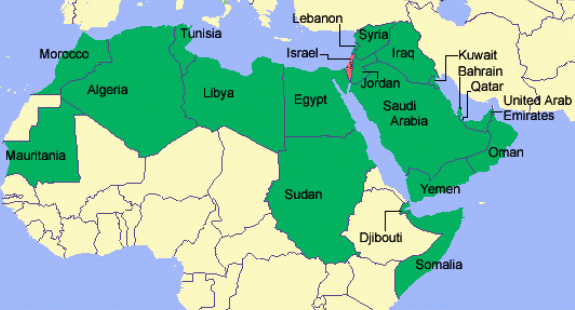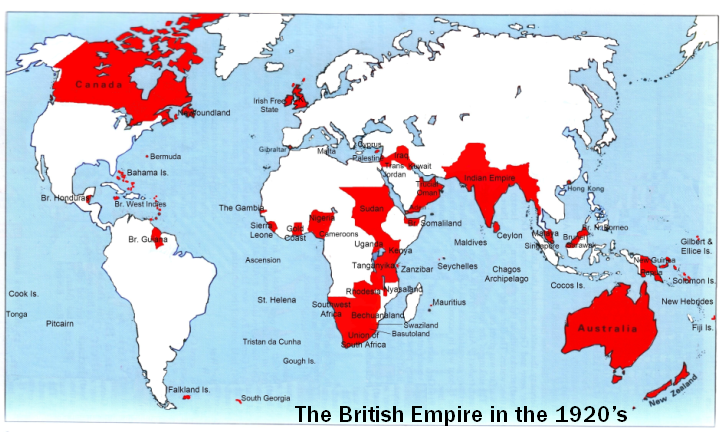From an article in Dissent (H-T: Bob):
"Yoav Peled, a professor of political science at Tel Aviv University, recounted the academic debate over whether Zionism should be viewed as a form of colonialism or national liberation. I was impressed at how well he argued his case for Zionism as colonialism, but shocked when in cross-discussion among the panelists he would not transcend his ideological box; tempers flared after he provocatively asserted that the 1967 Six Day War was not defensive on the part of Israel, because it had attacked Egypt first. While narrowly true, Peled ignored critical details that had prompted Israel’s attack: Egypt’s expulsion of UN peacekeepers, its aggressive deployment of a large army along the border, its blockade of Eilat, the mass hysteria of “patriotic” Egyptian mobs calling for war, and its new anti-Israel alliance with Jordan."
British Colonialist Empire:
French Colonialist Empire:
Belgian, German, Spanish, Italian, etc. Colonial Map in Africa:
Arab Colonial Map:
Ottoman Colonial Map:
Israel Colonial Map (Israel = red surrounded by green):
More, later
___________
Later (June 2):
"Yet Peled’s talking points are worth pondering. He noted that until the First World War, Jewish settlements were referred to as “colonies” (moshavot) and that the Bank Leumi (the “National Bank”) was initially called the “Jewish Colonial Trust.”
And Wiki in Hebrew has a more detailed entry in which it explains the difference between moshava in its "colonial" sense and "Moshava" as a common and colloquial Hebrew term for a type of agricultural settlement:
קולוניה (או מושבה בעברית, אשר יש להבדיל בינה לבין "מושבה" ו"מושב" במשמעותן כצורת התיישבות ישראלית) היא חבל ארץ הנמצא תחת שליטת ישות מדינית המרוחקת ממנו גאוגרפית. במשמעותה המודרנית, קולוניה מתאפיינת על פי רוב בשליטת מדינה זרה על חבל הארץ כתוצאה מכיבוש, המלווה ביישוב מתיישבים מארץ האם תוך קיפוח זכויותיהם של ילידיו המקוריים. המונח קולוניה קשור קשר הדוק למונחים קולוניאליזם ואימפריאליזם.
Colony (or "Moshava in Hebrew, to be distinguished from the terms "moshava" and "moshav" whose meanings designate different types of Israeli settlement) is a region controlled by a political entity which is geographically far removed from it. In its modern meaning, a colony is characterized mostly by the domination of a foreign country over a region as result of conquest, accompanied by the settlement of citizens of the mother country while disenfranchising the indigenous inhabitants. The term "colony" in this meaning is tightly connected to the terms "colonialism" and "Imperialism".
"Originally intending to establish a new settlement in the Achor Valley, near Jericho, the pioneers purchased land in that area. However, Abdülhamid II cancelled the purchase and forbade them from settling there, but they retained the name Petah Tikva as a symbol of their aspirations.
Undaunted, the settlers purchased a modest area (3.40 square kilometers) from the village of Mulabbis (variants: Mlabbes, Um-Labbes), near the source of the Yarkon River. The Sultan allowed the enterprise to proceed, but because their purchase was located in what was a malarial swamp, they had to evacuate when the malaria spread, founding the town of Yehud near the Arabic village Yehudiyya about 20 kilometres (12 mi) to the south.[citation needed] With the financial help of Baron Edmond de Rothschild they were able to drain the swamps sufficiently to be able to move back in 1883, joined by immigrants of the First Aliyah, and later the Second Aliyah.
During the Sinai and Palestine Campaign of World War I, Petah Tikva served as a refugee town for residents of Tel Aviv and Jaffa, following their exile by the Ottoman authorities due to their refusal to serve the Ottoman army to fight the invading British forces. The town suffered heavily as it lay between the Ottoman and British fronts during the war."








